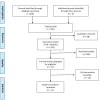Mental health conditions after snakebite: a scoping review
- PMID: 33257419
- PMCID: PMC7705584
- DOI: 10.1136/bmjgh-2020-004131
Mental health conditions after snakebite: a scoping review
Abstract
Introduction: Snakebite is a neglected tropical disease. Snakebite causes at least 120 000 death each year and it is estimated that there are three times as many amputations. Snakebite survivors are known to suffer from long-term physical and psychological sequelae, but not much is known on the mental health manifestations postsnakebite.
Methods: We conducted a scoping review and searched five major electronic databases (Ovid MEDLINE(R), Global Health, APA PsycINFO, EMBASE classic+EMBASE, Cochrane Central Register of Controlled Trials), contacted experts and conducted reference screening to identify primary studies on mental health manifestations after snakebite envenomation. Two reviewers independently conducted titles and abstract screening as well as full-text evaluation for final inclusion decision. Disagreements were resolved by consensus. We extracted data as per a standardised form and conducted narrative synthesis.
Results: We retrieved 334 studies and finally included 11 studies that met our eligibility criteria. Of the 11 studies reported, post-traumatic stress disorder (PTSD) was the most commonly studied mental health condition after snakebite, with five studies reporting it. Estimate of the burden of PTSD after snakebite was available from a modelling study. The other mental health conditions reported were focused around depression, psychosocial impairment of survivors after a snakebite envenomation, hysteria, delusional disorders and acute stress disorders.
Conclusion: There is a need for more research on understanding the neglected aspect of psychological morbidity of snakebite envenomation, particularly in countries with high burden. From the limited evidence available, depression and PTSD are major mental health manifestations in snakebite survivors.
Keywords: mental health & psychiatry; review; snake bite; stings and other evenoming.
© Author(s) (or their employer(s)) 2020. Re-use permitted under CC BY-NC. No commercial re-use. See rights and permissions. Published by BMJ.
Conflict of interest statement
Competing interests: None declared.
Figures
References
-
- Sachan D. The snake in the room: snakebite’s huge death toll demands a global response. BMJ 2018;361:k2449 10.1136/bmj.k2449 - DOI
-
- Gutiérrez JM, Warrell DA, Williams DJ, et al. . The need for full integration of snakebite envenoming within a global strategy to combat the neglected tropical diseases: the way forward. PLoS Negl Trop Dis 2013;7:e2162 https://dx.doi.org/ 10.1371/journal.pntd.0002162 - DOI - PMC - PubMed
Publication types
MeSH terms
LinkOut - more resources
Full Text Sources
Medical
Miscellaneous

